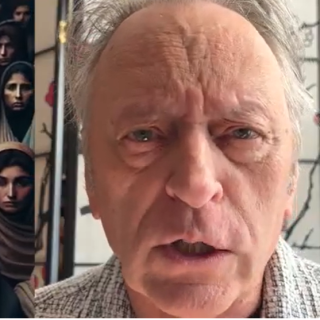Advertisement
More than 150 gathered at the Statehouse Thursday evening, October 12, to rally for Palestinian rights as violence continues to murder the people of the eastern Mediterranean.
Organized by students and residents alike (all of whom will remain anonymous due to right-wing efforts to discredit and ruin people fighting for human rights), the people gathered to voice their anger not just at the Israel government’s continued use of violence to justify their occupation of Palestine, but hope for a better future.
The people gathered around the William McKinley statue at the west end of the Statehouse lawns – a common place for protestors in the city – as speakers established ground rules for the protest. For the first time in the author's experience downtown, a Police liaison was established to direct the city’s blue-vested “Dialogue Team,” who were expectably meandering the crowd trying to start small-talk, to a single person when problems arose, and everyone was reminded of the efficacy of engaging with counter-protestors. Sure enough, a single man stood at the edge of the crowd holding a sign arguing that Palestinian rights were synonymous with Jewish genocide. Despite the announced rule, many protestors shared their thoughts on the sign, most with a single finger.
This mixture of anger and hope dominated the crowd. On the anger side, denunciations of the Israeli government’s 75-year-long genocide of the Palestinian people were at the forefront of every speaker's thoughts. “How can you say you value human life and be silent about Gaza?” one speaker asked as the crowd nodded in approval. One speaker was more focused on conversations on the topic in their regular life, addressing those who said they couldn’t have “sympathy” for Palestinians due to the ongoing violence: “Sympathy is not why this movement exists. Our people were not born to be tragedies.”
This anger was not directed only at the Israeli government itself, though; the United States drew just as much criticism. Commenting on the massive amount of financial aid given to Israel – numbering in the billions – speakers spoke against their own government just as directly. “Do we, as Americans,” support this?” the speaker asked. “No,” cried the crowd, call-and-response questions an easy way to engage the crowd.
Although angry, the humanity of people was emphasized continuously through the speeches. The humanity of the people being bombed, starved, and concentrated into ghettos in Gaze, of course, but also the humanity of the people standing in solidarity with them. “I’ve never lived through that experience,” one speaker stated, speaking of the experience of living in an occupied warzone. “How can I sit here and tell them they do not have a right to resist?” One speaker pointed out the long history of human resistance to occupiers: “As long as there is an occupation, there will be resistance. It happens in the history of all occupations.”
Despite the anger, hope sprung from the crowd just as strongly. Hope that the violence would end. Hope that Palestinians could be free. Hope that we could make a positive difference here, even though we are thousands of miles away. Hope that we could change peoples’ minds, not just standing in front of the statehouse, but in our homes, workplaces, and community by having conversations with people and dispelling the misinformation. Hope that America’s government, both in Ohio and federally, could change, and praise was heaped upon Rep. Munira Yasin Abdullahi for being one of the only local politicians to stand for Palestinian freedom. Despite everything going on, there was hope for a better future.
Before marching, the final speaker brought attention to the flags surrounding the Statehouse. Around the McKinley statue were four flags: an Ohio flag on the left, two center American flags and a Ukraine flag to the right, all flying at half-staff. DeWine had ordered the flags to be lowered “in response to the unprovoked attack and invasion of Israel.” The speaker brought attention to the Ukrainian flag, flying since the Russian invasion of the country last year. There flew a flag to support people being invaded by an outside power flying half-staff in support of an outside power invading another people. The hypocrisy was telling, and this one simple thing seemed to embody the disappointment felt by the people on the streets that day. But the protestors did not dwell on this hypocrisy and began marching. The chants were straight forward.
“Free, free Palestine.”
“From the river to the sea, Palestine will be free.”



